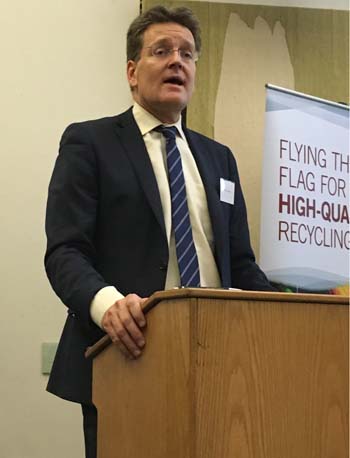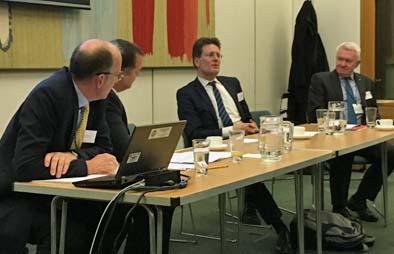Speaking on 9 December at the Resource Association’s parliamentary reception in London, Julius Langendorff, deputy head of the Commission’s waste unit, revealed how the Commission, “was perhaps a bit surprised” at the concern about withdrawal of the previous Circular Economy package which had been agreed by its predecessor Commission in July 2014.

And, Mr Langendorff suggested there were considerable disagreements within the Commission and Member States this time around over landfill reduction targets with the Environment Directorate needing to have “argued very strongly for landfill reduction and recycling targets”.
He implied that because of disagreements among member states, “the measures for landfill are long-term, there are no interim objectives for landfill.”
“Part of the reason for the different approach to landfill are in the methodology for decision-making,” he explained. “Higher recycling targets lead to higher benefits. Assessing landfill reduction targets requires taking account of both quantifiable and non-quantifiable costs.”
This background of disagreement among Member States and the Commission, it is understood, is likely to impact on the agreement of the Circular Economy package which could take at least two years to finalise. Mr Langendorff would only say that “it would be a great result if we were to get a deal in the next 12 months but it could take longer”.
Targets
The Commission is proposing a 65% recycling target by 2030 with 60% by 2025 and a landfill reduction to 10% by 2030. The official noted that there were plans to have a review of the 2030 target in 2025 and a level of 70% for 2030 is already being talked about. And, he highlighted how the UK at about 44% recycling is above the EU average.
He also noted that the Circular Economy package applies to “municipal and packaging waste” and said that priority sectors include plastics and food waste as well as biomass and bio-based materials.
In a move to what could be seen by some as to ‘sweeten the pill’ in terms of the new proposed targets, Mr Langendorff highlighted that “money is available under Horizon 2020 and also £5.5billion in the cohesion funds for waste management, if taken up member states for waste infrastructure”.
He made a number of other key points including:
- BREF best practice waste techniques document will be important
- reuse and recycling of metals from incinerators will count towards targets
- there will be standardisation of data reporting
- recycling methodology will include at the final recycling process, the output of sorting plant, and separately collected materials
- the separate collection of bio waste called for next to the separate collection of other materials will be a simple imperative if we want to recycle more of the municipal waste (this forms part of the TEEP side of legislative to be discussed)
Responding to questions about the export of RDF, Mr Langendorff said that there had been “mistakes in investment in the past” over the amount of incineration capacity built in northern Europe.
And, he also claimed that there had been mistakes in the amount of big investments made in MBT facilities. As to whether UK exports to the continent were sensible, he responded: “Export of waste makes sense to a certain extent but not on a permanent basis, to transport from Greece to the Netherlands, makes sense as a transitional period.”
Resource
Addressing the reception, Ray Georgeson, chief executive of the Resource Association told delegates that while there was a lot of focus on the target number, the reality was that the package as a whole was very important, and it was important not just to focus on the targets.

“The Circular Economy package is in two parts that will shape the development of the future for the next 15 years. That’s why it’s so critical.”
However, he said that by keeping to weight-based targets, the Commission had missed an opportunity by not opting for targets set around carbon measurements and waste prevention. But, he added: “Having said that, the landfill reduction target is very welcome, although in this room, for England, 65% does feel like a stiff challenge by 2030.”
Mr Georgeson also emphasised the need for quality recycling, claiming that “contamination of recyclates is severely damaging the UK reprocessing sector.”
And, he said that, on TEEP rules and biowaste, “government will have to provide guidance this time for local authorities to determine what practicality actually means”.
He then turned to the UK reaction to the circular economy package and Defra. “I am looking forward to their reaction and a consultation. How will they address the need for pull measures? The message I think for Defra is you need to return to the drawing board.”
Mulholland
At the end of the reception, the work of the Resource Association was praised by Greg Mulholland, Liberal Democrat MP for Leeds North West which includes the town of Otley where the association is based.
Mr Mulholland said: “I am delighted that this excellent trade association is in Otley. There has never been a more important time to have a single unified voice for the recycling sector. There is not enough listening to our experts, the pioneers of what does work and doesn’t and about the policies that deliver and those that don’t. As far as I am concerned you are the people who can tell us how to do it better and the people to listen to.”











Subscribe for free